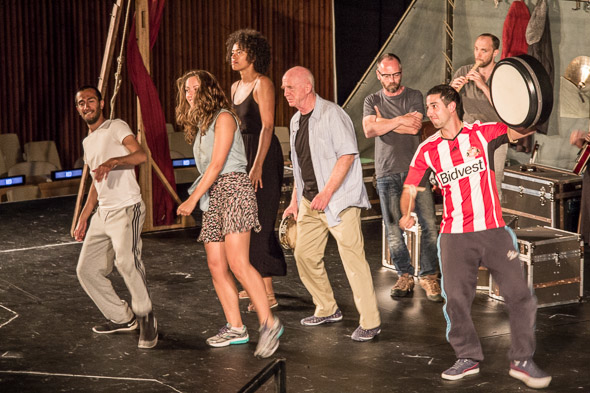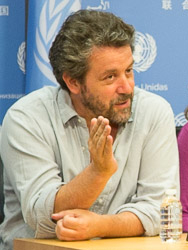In Times of Global Turmoil, "The Play's the Thing"

(© Seth Walters)
A heartening symbol of international peace was delivered to the United Nations on Monday evening in the unconventional package of Shakespeare's blood-soaked tragedy Hamlet. In honor of the UK's August Presidency of the UN Security Council, the diplomats were offered a brief respite from their headline-making peace negotiations to enjoy a performance by the Globe Theatre's world-touring production —world being the operative term.
Between April 23, 2014 and April 23, 2016, the British company plans to stage its production of Hamlet in every country on Earth — a follow-up to its 2012 Globe to Globe Festival, which invited overseas companies to the UK to perform works of Shakespeare in their native languages. While the company's artistic director Dominic Dromgoole admits the global tally of countries remains as fluid as the oceans they traverse, the UN performance completes number 28 of their planned 205 sit-downs.
Though the tensions flaring in Israel, Palestine, the Ukraine, South Sudan, and many other politically tumultuous regions around the world remain at the forefront of the UN agenda, the Globe's celebratory visitors shared their own tales from these warring nations.
"We very thrillingly played both Moscow and then very shortly after the Ukraine," Dromgoole recalled. "We were in the Ukraine on the night before the elections in Kiev. Suddenly we became the ticket that everybody in the incoming political class had to get. We had all of the heroes of Maidan Sqaure, [including] Petro Poroshenko, who was about to be president the next day. It was thrilling to see that commitment by the political class to celebrate Shakespeare."

(© Seth Walters)
When asked if the company would venture to Palestine — a region currently embroiled in a bloody conflict with its neighboring Israel and whose status as an independent nation remains widely disputed — Dromgoole offered a quick response. "We'd love to if we could," he said. "We accepted a show from them when we did the Globe to Globe festival. They did an absolutely brilliant Richard II."
Dromgoole describes his company's world tour as an expression of the Globe Theatre's "commitment to internationalism" — fittingly one of the primary tenets and founding principles of the United Nations. "We decided that inclusivity was a much better policy than exclusivity," he commented. "If you do start excluding anyone, you've got to ask the question, where do you start and where do you stop? We're obviously not going to put our company in harm's way, but we are going to do our damndest to get in everywhere."
Their determination has brought them to audiences and theaters of all shapes and sizes, from Roman amphitheaters to small market squares before audiences who have never before experienced a piece of live theater. "Four children were watching us rehearse as we were preparing for the play in a square in Romania," recounted Rawiri Paratene, who performed the role of the Ghost yesterday evening. "They stayed right through the hour-long rehearsal and then right through a rainy show in an outdoor venue, watching us perform in a foreign language with this story that they didn't know. And they wanted to stay and watch the second show."
Even with the inevitable language and culture barriers, the Globe's international audiences have found ways to connect to the Shakespearean text, whose themes, Dromgoole notes, have a particular resonance in the halls of this international peace-keeping body. "[Hamlet] is all about a person who is ill at ease in his own time," the director noted. "He's restlessly looking to create a new way of living, a new way of thinking, a new way of being. Wherever you go, you see people who are dissatisfied with the world they're in and they're looking to create a new idea of what the future is."
Paratene added his own subdued perspective as to the role of the thespian in identifying this new and (hopefully more peaceful) future. "All we can do is tell the story," he flatly stated. "If they glean from that something that makes the Israeli representative go to the other side of the room and sit next to the Palestinian representative, that would be very nice. But that's not what we're here to do — we're here to tell a story."










